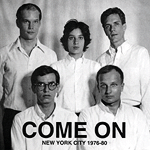 |
 |
|
|
|
| |||
 Come On
Come OnNew York City 1976-80 [Heliocentric] Rating: 4.0 Why do I feel as if I'm being put on? Remember the Rutles? If the Kids in the Hall had done for the Talking Heads what Monty Python did for the Beatles, this album would be the hilarious result. Come On were an art-pop quintet who were part of the New York scene during the last half of the 1970s. They were unappreciated in their time, and basically unheard of outside a small area and span of time: their recording career evidently consisted of one self-released single and one song which appeared on a compilation of New York bands. Now, Heliocentric Records has gathered together that staggering three-song body of work, thrown in a live performance at CBGB's, and given us this retrospective-- twenty years after the fact, with little or even no popular demand. Perhaps they think that Come On's time has finally come. They are wrong. It has not. Come On's great, long-lost sound combines the jerkiness and lyrical minimalism of early Talking Heads with the pointy guitar sound and crazed vocal delivery of, um, early Talking Heads. What makes them different from, say, early Talking Heads is that they display the musicianship and melodic prowess of the early Sex Pistols, with the same level of lyrical complexity. You want minimalism? Check out the lyrics to "Mom & Dad:" "Mom and dad/ They're not my parents/ Can't they use the telephone?" Yes, that's the whole song. Why is the song nearly four minutes long? I do not know. The case could be made, and no doubt will be by somebody somewhere, that Come On is as emblematic of their time as Television or Patti Smith, and that they were as much a product of the historical moment as any of their more-successful contemporaries. "The critical success and commercial longevity of any group is as dependent on the manifold and ineffable vagaries of chance as on talent and hard work," they'll say. All this may be true, but to my ears, it sounds as if Come On were lost to history for a reason: they just weren't that good. This sparse collection of amateurish chording and self-consciously arty whispering isn't likely to convince anyone that Come On should have survived the Galapagos of New York in the '70s. Much has been made (mostly by the band itself, in an effort to convince us of their saliency) of Come On's many famous fans: Thurston Moore, Klaus Nomi, Willem Dafoe, Jeff Koons, and even David Byrne and Brian Eno. Was Byrne taking the piss when he took Bowie and Eno backstage to talk to Come On? Probably. Do you care what kind of music Jeff Koons listened to while he and Cicciolina rolled around in those life-size romance novel covers? Please, no. Is this album interesting at all outside of its historical significance as a document of a band who didn't quite make it? Maybe, just for a second. That is, if it's real. I'm not convinced. One of the band members looks a little like Bruce McCulloch.
|
|||

